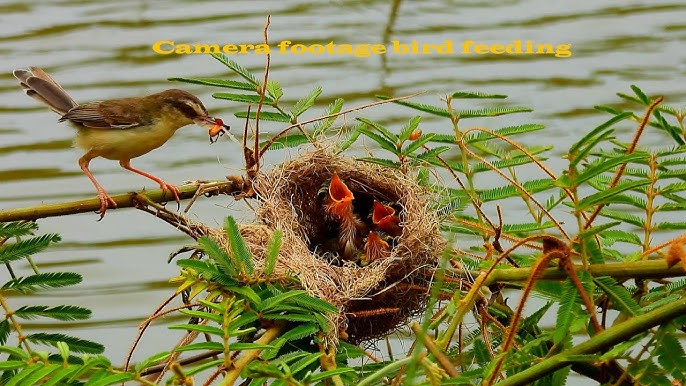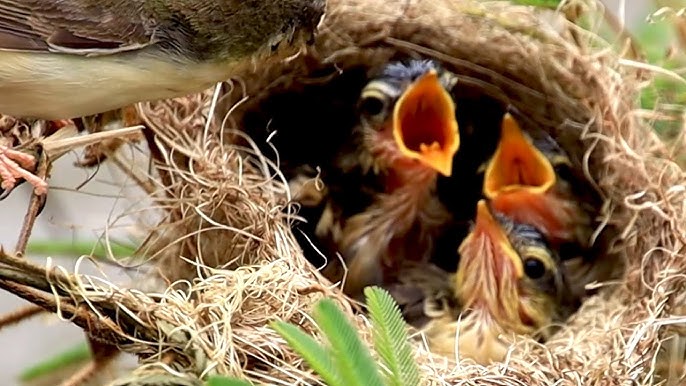Have you ever wondered what baby birds eat to grow strong and healthy? If you’ve spotted a tiny bird in your backyard or found a little nestling, you might be asking yourself, “Can a baby bird eat a worm?” This question is more important than it seems because what you feed a baby bird can make all the difference in its survival.
Keep reading to discover the surprising truth about baby birds and worms—and learn how you can help these fragile creatures thrive. Your curiosity could save a life!
Diet Of Baby Birds
Baby birds need special food to grow strong and healthy. Their diet changes as they get older. Understanding what they eat helps us care for them better.
Many people wonder if baby birds can eat worms. Worms are a natural part of some baby birds’ diets. Let’s explore what baby birds usually eat and their nutritional needs.
Common Food Choices
Baby birds eat different foods depending on their species. Some eat insects like worms, while others eat seeds or fruit. Here are common foods baby birds eat:
- Worms and insects
- Seeds and grains
- Fruits and berries
- Small pieces of soft plants
- Regurgitated food from parent birds
Nutritional Needs
Baby birds need protein, fats, and vitamins to grow well. Protein helps build muscles. Fats give them energy. Vitamins keep their bodies healthy.
| Nutrient | Purpose | Sources |
|---|---|---|
| Protein | Builds muscles and tissues | Worms, insects, seeds |
| Fats | Provides energy | Insects, seeds |
| Vitamins | Supports immune system | Fruits, berries |
| Water | Keeps body hydrated | Food and drinking |

Credit: www.youtube.com
Are Worms Safe For Baby Birds?
Baby birds need food that helps them grow strong and healthy. Worms are often seen as a natural food source for many bird species. People wonder if worms are safe and good for baby birds to eat.
This article explains the benefits of feeding worms to baby birds. It also looks at some risks to keep in mind before offering worms.
Benefits Of Eating Worms
Worms provide important nutrients that baby birds need. They are easy to digest and full of protein. Protein helps baby birds build strong muscles and grow fast.
Worms also contain moisture that helps keep baby birds hydrated. Many birds naturally eat worms in the wild, so worms match their natural diet well.
- High in protein for growth
- Easy to digest
- Good source of moisture
- Natural part of many bird diets
Potential Risks
Not all worms are safe for baby birds. Some worms may carry parasites or bacteria that can harm birds. It is best to avoid worms from polluted or treated soil.
Feeding worms that are too large can cause choking or digestion problems. Always choose small worms suitable for the baby bird’s size.
- Worms may carry harmful parasites
- Risk of bacteria from dirty environments
- Large worms can cause choking
- Make sure worms come from safe places
How Baby Birds Eat Worms
Baby birds often eat worms as part of their diet. Worms provide important nutrients that help them grow strong.
Young birds need special ways to eat worms because they are still learning how to feed themselves.
Feeding Techniques
Baby birds use their small beaks to grab worms. They usually open their mouths wide to catch the worm.
Sometimes, baby birds swallow worms whole. Other times, they bite the worm into smaller pieces.
- Open mouth wide to catch the worm
- Swallow worm whole or in pieces
- Use quick movements to grab wriggling worms
Parental Assistance
Parent birds help baby birds learn to eat worms. They bring worms to the nest and feed the babies directly.
Parents also show how to handle worms. This helps baby birds practice catching and eating worms on their own.
- Parents catch worms and bring them to babies
- Feed worms directly into baby birds’ mouths
- Teach baby birds to catch and eat worms

Credit: stock.adobe.com
Alternatives To Worms
Baby birds often eat worms for protein. But there are other good foods that provide the nutrients they need.
These alternatives help keep baby birds healthy. They can be easier to find or prepare than worms.
Other Protein Sources
Protein is important for baby birds to grow strong. You can offer insects like small crickets or mealworms as a good option.
Soft cooked eggs also provide protein. Small pieces of fish or finely chopped lean meat work well too.
- Small crickets
- Mealworms
- Soft cooked eggs
- Small pieces of fish
- Lean cooked meat
Suitable Plant-based Foods
Some baby birds can eat plant-based foods. These foods give energy and vitamins to help them grow.
Offer soft fruits like mashed bananas or berries. Cooked vegetables like peas or sweet potatoes are good too.
- Mashed bananas
- Berries
- Cooked peas
- Cooked sweet potatoes
Feeding Baby Birds In Captivity
Feeding baby birds in captivity requires care and attention. Their diet must be balanced to help them grow strong and healthy.
Many people wonder if baby birds can eat worms. Worms are a natural food for some birds, but there are rules to follow when feeding them.
Proper Diet Guidelines
Baby birds need food rich in protein and moisture. Soft foods like soaked dog kibble, insects, and worms work well.
Worms are good for baby birds, but only if they are fresh and clean. Avoid feeding wild worms that might carry parasites.
- Use mealworms or earthworms from a trusted source
- Feed small pieces to avoid choking
- Mix worms with soft fruits or soaked grains
- Feed every 20-30 minutes during daylight
Avoiding Harmful Foods
Some foods can harm baby birds. Avoid giving them bread, milk, or processed foods. These can cause illness or poor growth.
Also, do not feed wild worms or insects that might carry diseases. Never give salt, sugar, or spices.
- No bread or bread crumbs
- No milk or dairy products
- No wild-caught insects or worms
- No salty or sugary foods
- No spicy or seasoned foods
Signs Of A Healthy Diet In Baby Birds
Baby birds need the right food to grow strong and stay healthy. One common question is if baby birds can eat worms. Worms are a natural part of their diet and provide many nutrients.
To know if a baby bird is eating well, watch for signs of good health. These signs show the bird is getting enough food and the right nutrients.
Growth Indicators
Healthy baby birds grow quickly. Their feathers start to develop and their bodies get stronger. Weight gain is an important sign of a good diet.
Look for these growth signs:
- Steady increase in body weight
- Development of feathers and wing strength
- Bright eyes and smooth skin
Behavioral Signs
Baby birds with a healthy diet are usually active. They open their mouths wide when hungry and respond to sounds or movement.
Other behavior signs include:
- Strong begging calls for food
- Alertness and quick reactions
- Good muscle tone and movement

Credit: www.youtube.com
Frequently Asked Questions
Can Baby Birds Safely Eat Worms?
Yes, many baby birds eat worms as a natural protein source. Worms provide essential nutrients for growth and development.
When Should Baby Birds Start Eating Worms?
Baby birds can start eating worms shortly after hatching when parents feed them. This varies by species and age.
Are Worms The Best Food For Baby Birds?
Worms are nutritious but not always the sole food. Baby birds also need insects, seeds, and regurgitated food for a balanced diet.
How Do Parent Birds Feed Worms To Chicks?
Parent birds soften worms and break them into small pieces. They then gently feed the worms directly to the chicks.
Conclusion
Feeding baby birds requires careful attention and understanding. Worms can be nutritious but not always suitable for all baby birds. Their digestive systems are still developing. It’s vital to know the species’ diet needs. Soft foods or pre-digested options might be better.
Observing their growth is crucial. Healthy development ensures they become strong adults. Always consult an expert before feeding wild baby birds. This ensures their safety and well-being. Remember, a balanced diet supports life. Helping baby birds thrive brings joy. Care and knowledge make a difference.

